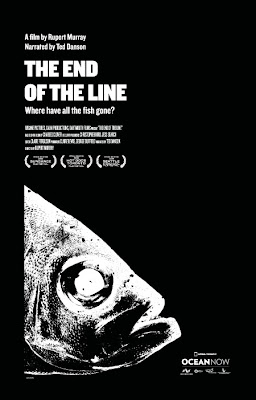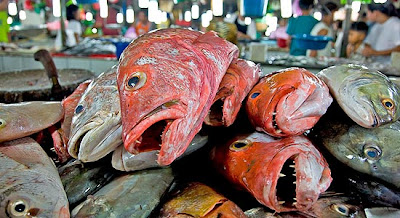 When I went to see End of the Line at Nu Metro in the V&A the other night, I was disappointed but not surprised. I was disappointed to see that there were only about twenty people watching the documentary while half the other movies were completely sold out. I was not surprised though, documentaries are always badly supported. Why is it that people are so reluctant to learn new things? If you eat seafood, you need to watch this documentary, it’s a simple as that.
When I went to see End of the Line at Nu Metro in the V&A the other night, I was disappointed but not surprised. I was disappointed to see that there were only about twenty people watching the documentary while half the other movies were completely sold out. I was not surprised though, documentaries are always badly supported. Why is it that people are so reluctant to learn new things? If you eat seafood, you need to watch this documentary, it’s a simple as that.
Do you enjoy seafood? Do you like to be spoilt with oysters and champagne? Do you love eating sushi a few times a week? Do you enjoy a nice fillet of linefish for dinner every so often? Maybe you love a platter of prawns or other shellfish. Well, how would you like it if you could never have those things again? Then how would you like it if I told you that the reason you could never have seafood again is because a few people wanted to get rich by fishing every last fish out of the sea.
The sea is a shared resource which brings untold benefits to all who inhabit the earth, but there are only a few people who make big money from abusing the resource which should belong to all of us. Having said that, you and I are not guilt free. As consumers, our insatiable appetite for seafood drives the industry.
The crux of the problem is this: Fish stocks have been depleted by 90% in the last 50 years.
How did we get there? And people have been fishing for millenia so why has this happened in the last 50 years? I’m glad you asked, it’s a good question. The answer lies in technology. Huge ships which can travel to all parts of the ocean, equipment such as radar, sonar, etc which can find fish wherever they may be hiding. Then there are the nets, which are dragged through the ocean and are big enough to hold thirteen 747 aeroplanes. In addition to this the nets trawl along the ocean floor, wreaking abolute havoc and destroying habitat.
There is no way that fish can survive against these tools, especially used in the ruthless manner that characterises humans driven by greed. Something has to be done, and the good news is that some things are being done. But these initiatives need our support.
Many people think that farmed fish will be the answer, but unfortunately farmed fish still have to be fed with other fish. It takes about 5kgs of small fish like anchovies to create 1kg of salmon. We might as well eat the smaller fish (luckily I love anchovies and sardines, so I’m ready to do my bit!). Fish farming is not sustainable for this reason but there are several other reasons why fish farming is not a good solution.
One of the best solutions to the issue of declining fish stocks is the establishment of marine reserves. This will create interlinking areas of ocean where fishing will be banned and scientists will monitor the well being of the fish stocks and the marine ecosystem. There are challenges to this solution, such as protecting migratory fish and also enforcing the no fishing policy.
Eat and order SASSI green list fish so that the demand for the over fished species drops. Spread the awareness, when you order fish, ask where it came from and if it is sustainable. Speak to people, inform them about this serious issue we have because the chances are, they didn’t see the documentary.
See the trailer and find out more here

Comments
5 responses to “End of the Line review”
Great movie. Clear and not boring at all.It is a no brainer to fix but how do we rein in human greed?
Hey Dax
I was also pretty shocked at the viewing last night at Nu Metro V&A Waterfront. Both for the images and statistics, as well as the lack of support for the movie. The cinema entrance was packed and of all those people, only 6 people were at The End Of The Line (Including myself and my girlfriend)
I don’t eat a lot of fish other than the odd occasion I go to sushi so it’s not something I’m part of, but being a part of the world we all have responsibilities and concerns. So I like to keep ahead of all the problems.
It was strange because we walked out the movie and everyone was eating at Willoughby’s, blissfully unaware.
I think the thing we need to be aware of is also supporting restaurants that only serve sustainable seafood. It’s all very well eating fish from the SASSI green list, but what is the point if we are supporting a restaurant that serves fish from the red list? And it goes further than this, these restaurants need to buy from fisheries that only practice sustainable fishing. If a restaurant buys fish from the green list, but that fishery catches fish from the red list, then this is also no good at all.
On that note, I wonder how many restaurants in Cape Town are fully sustainable with regards to their seafood?
It’s a fantastic documentary to watch and one that I’ll recommend to all my friends, but for it to be effective, we all need to take action and be on the look our for restaurants not following the rules.
You’re absolutely right, Sean. We need to start making the chain accountable at each step.
There are some difficulties in enforcing this. We need someone to independently rate restaurants in terms of their green credentials. To audit their sourcing of meat and fish, etc. As well as their recycling and bottled/tap water policies.
Any volunteers?
Yes, I volunteer.
Give me a little time..
Hey Dax, I’m definitely going to see this movie. There is a Indian prophecy that states “Only when the last tree has been cut down,Only when the last river has been poisoned,
Only when the last fish has been caught,Only then will you find that money cannot be eaten.
— Cree Indian Prophecy
I fully support your views on this one!! Each one of us must start to take responsibility for our actions, as it begins with us.
Kurt